Key takeaways:
- Observing opponents’ body language and adapting strategies can significantly enhance gameplay and decision-making.
- Effective resource management and knowing when to take risks or play defensively are crucial factors for success in card games.
- Flexibility in strategy, including shifting tactics mid-game, can lead to unexpected victories and improved outcomes.
- Patience and emotional control are important, as impulsive decisions can negatively impact performance and teamwork.
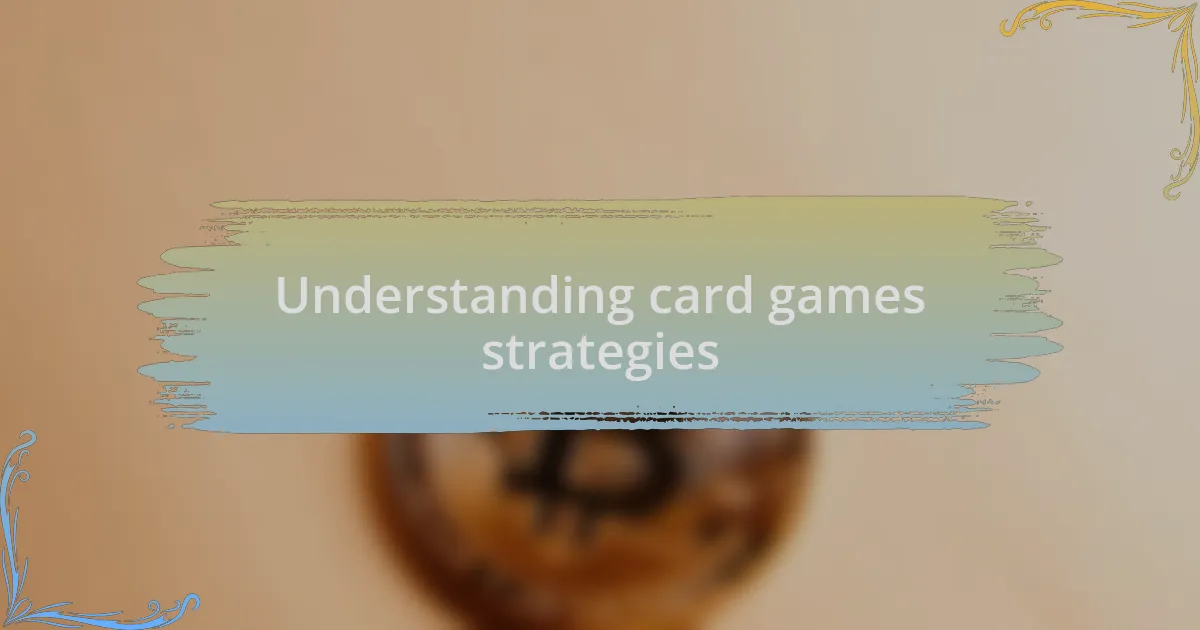
Understanding card games strategies
Understanding card game strategies requires a blend of observation, prediction, and emotional intelligence. I recall a time I was deep into a game of poker with friends; I noticed how their body language shifted with each round. It made me think: how much does your intuition play into your strategy? Being able to read others can enhance your gameplay immensely.
Another aspect to consider is resource management—knowing when to hold on to your cards and when to use them. I remember a match where I hesitated to play a powerful card, thinking it might be better later. That moment of indecision taught me that timing can be everything; it’s not just about the cards you hold, but how you play them at the right moment. Have you ever faced a similar dilemma?
Moreover, adaptability in your strategy can make a significant difference in the outcome of these games. During a recent game night, I switched my approaches based on how my opponents were playing. It felt exhilarating to change my tactics mid-game, demonstrating that flexibility can be just as critical as a well-constructed plan. How often do you find yourself adapting your strategy in the heat of the moment?
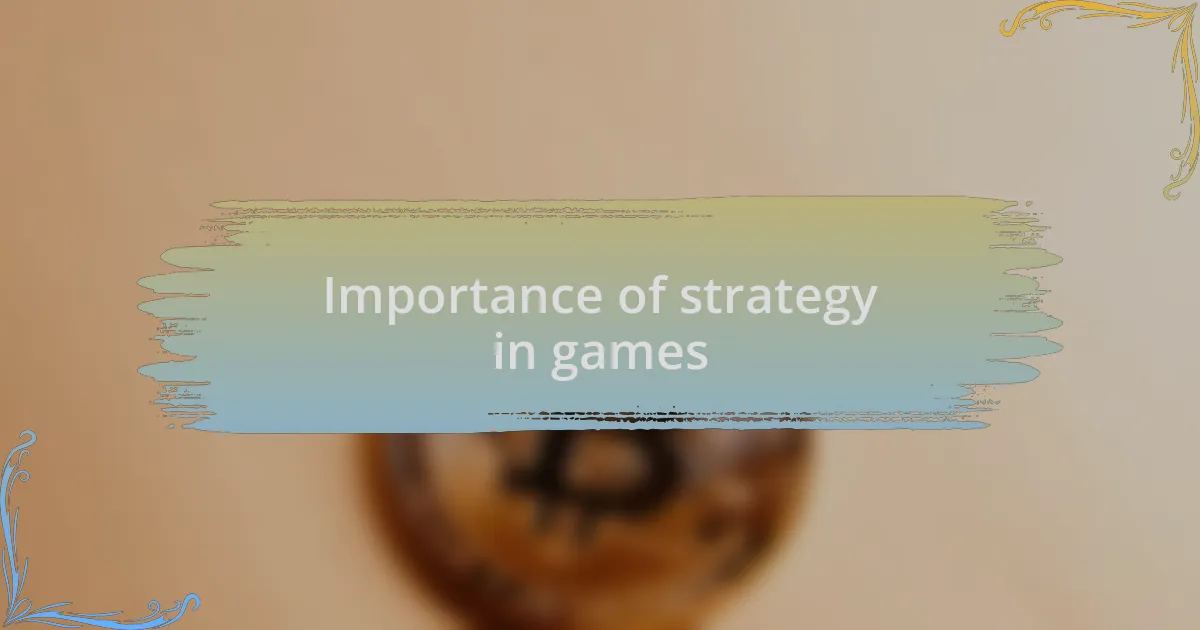
Importance of strategy in games
The significance of strategy in games cannot be overstated. I remember a particularly intense game of bridge where my partner and I had to coordinate our moves meticulously. Every decision felt like a weighty one, as our understanding of each other’s strengths was crucial. Have you ever been in a situation where your strategy was the deciding factor in a game?
Thinking ahead is vital, especially in games that involve multiple players. I once found myself in a situation where I could have easily taken a strong player out of the game early on, but I chose to keep my focus on the quieter opponents. That choice turned out to be a pivotal moment; it taught me that sometimes, preserving your position while waiting for the perfect opportunity can be more rewarding than aggressive plays. How often do you weigh your options before making a move?
Additionally, strategy fosters a deeper connection between players. I recall a game night where we discussed our thought processes after each round. Sharing our strategies not only enhanced our gameplay but created camaraderie among us. It led me to wonder: does strategy not just improve your chances of winning, but also enrich the experience of playing together?
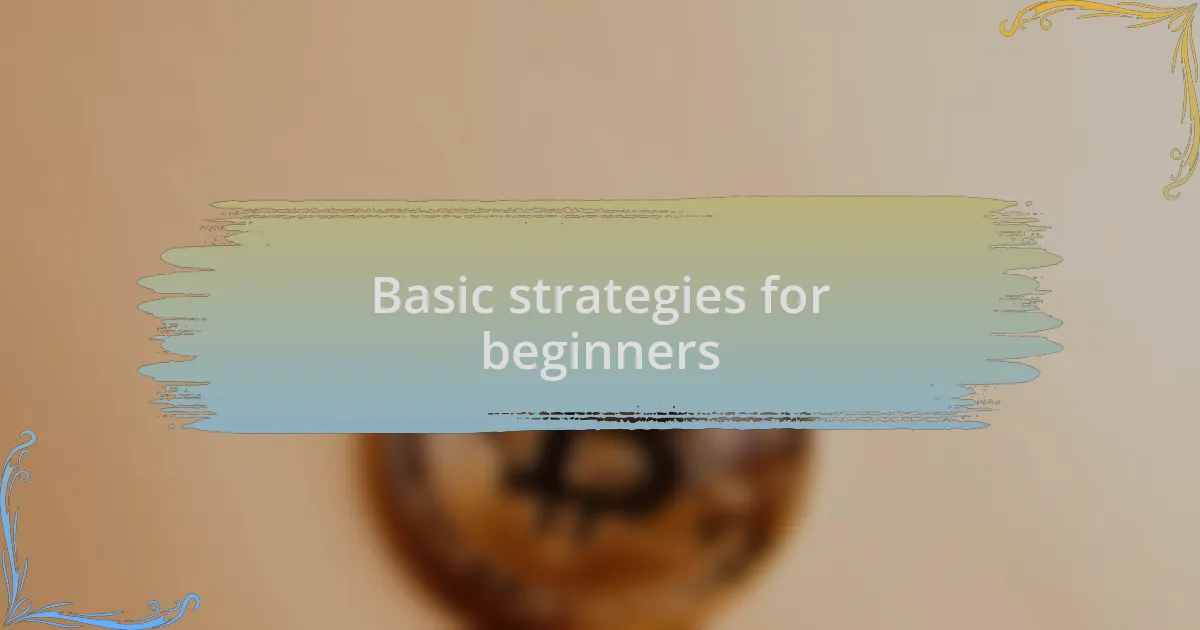
Basic strategies for beginners
When it comes to card games, especially for beginners, understanding the basics is essential for building a solid foundation. I remember my first game of poker; I was overwhelmed by the choices. It taught me the importance of knowing the rules and hand rankings inside and out. Have you ever felt lost in a game? Familiarizing yourself with the rules can transform confusion into confidence.
Another key strategy for beginners is to observe your opponents. During a friendly game of Uno, I discovered that watching how others play offers insights into their strategy. It’s like deciphering a code—the more you notice, the better you can anticipate their moves. Do you pay attention to your opponents, or are you too focused on your own hand? Sometimes, subtle clues can give you a significant advantage.
Finally, patience is a virtue in card games. I once rushed through my turns in a game of rummy, eager to finish. I quickly learned that taking a moment to assess the table and reconsider my options was often the difference between victory and defeat. How often do we rush when we shouldn’t? Learning to wait for the right moment can be incredibly rewarding.

Applying strategies to card games
When applying strategies to card games, I find that managing your resources wisely is crucial. For instance, I remember a time playing blackjack where I had to decide whether to hit or stand based solely on my hand and the dealer’s card. It was a tense moment, like walking a tightrope. But weighing my options carefully helped me make choices that led to my success. How do you assess your moves under pressure?
Another important strategy is adapting your approach based on the type of game. While playing a strategic game like Magic: The Gathering, I learned that building a flexible deck can be a game-changer. I often switch tactics mid-game based on my opponent’s play style. Have you ever considered tweaking your strategy on the fly? It’s fascinating to see how quick adjustments can lead to surprising victories.
Lastly, practicing emotional control can elevate your game. I recall a heated game of Bridge where emotions ran high, and I was tempted to react impulsively. By taking a deep breath and staying calm, I not only improved my decision-making but also helped keep my teammates focused. How do you handle stress while playing? Maintaining composure can truly be a secret weapon in competitive card games.
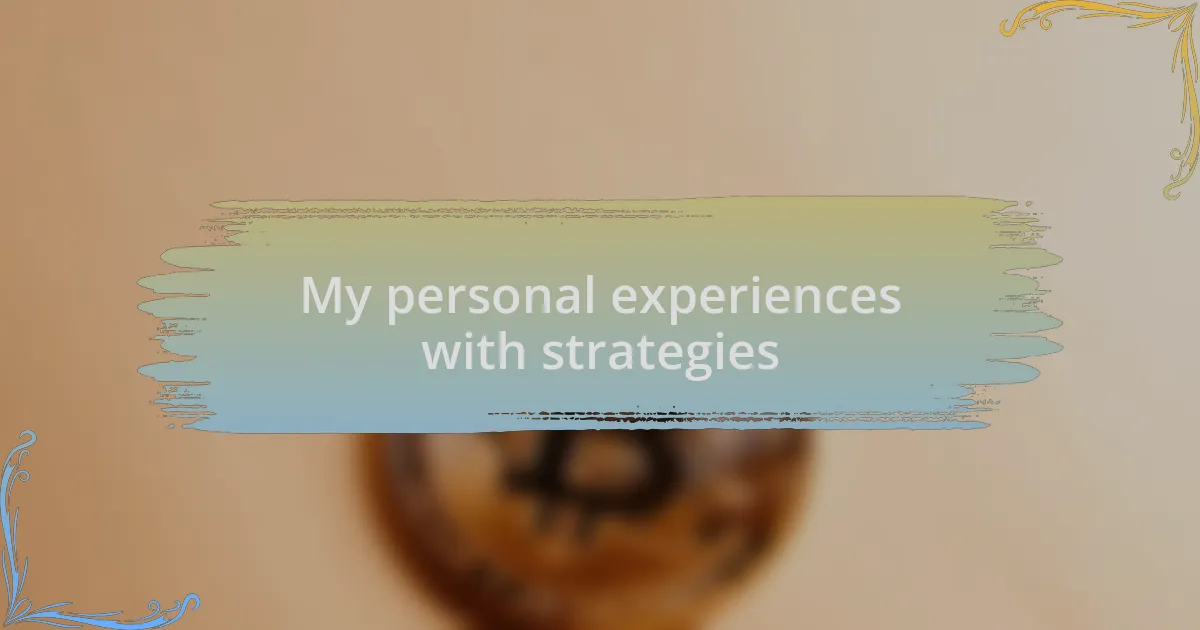
My personal experiences with strategies
I once participated in a poker night that turned into a lesson on reading body language. I noticed how my friends would fidget when they had a strong hand, even if they thought they were hiding it well. This taught me the value of observation; sometimes, the best strategy is to pay attention to what isn’t being said. Have you ever caught a tell that changed your approach mid-game?
In another instance, I played a game of Hearts where I decided to adopt a defensive strategy. My goal was to avoid taking point cards while subtly pushing my opponents into taking them. It was exhilarating when I saw my carefully laid plan unfold, leading to my victory. I learned that patience can be just as effective as aggression. Have you found that playing defensively can flip the outcome in your favor?
There was also a memorable time during a casual game of Spades when I misjudged my partner’s hand. I was overly confident, assuming we could take more tricks than we could handle. The disappointment of losing that round was tough, but it taught me to communicate better and trust my partner’s instincts. How do you balance confidence and collaboration in team-based games?
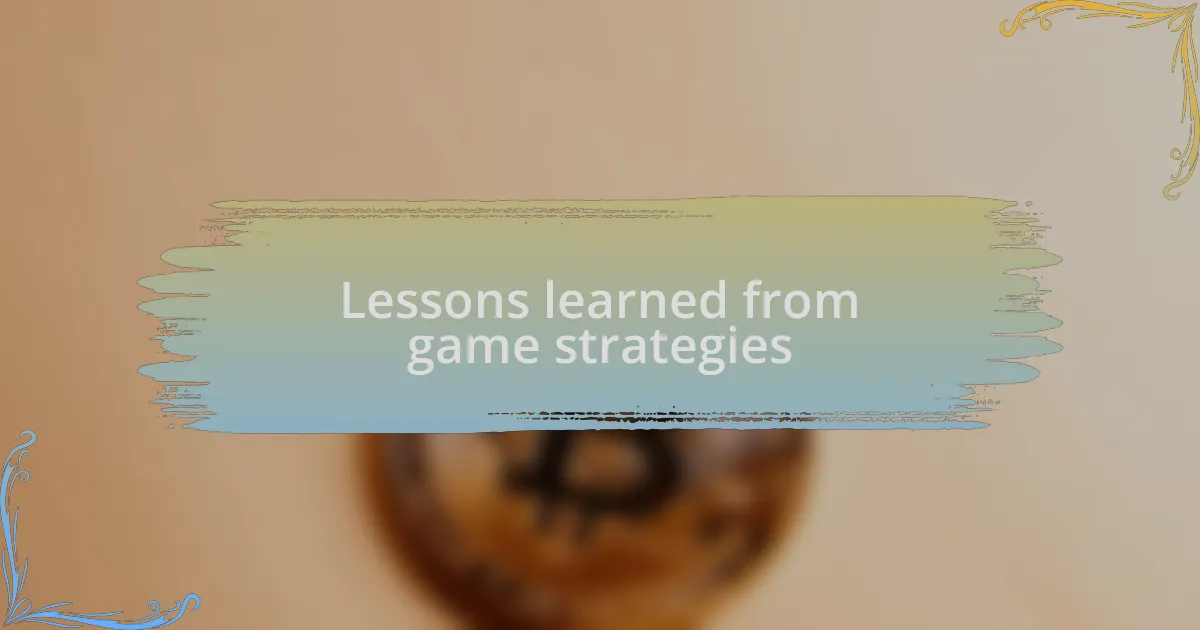
Lessons learned from game strategies
During one game of Uno, I faced a tough situation when my strategy backfired. I focused on holding onto powerful cards, thinking they would secure my win. Instead, I ended up stuck with a handful of cards as the game ended, learning the hard way that adaptability is crucial. Have you ever held onto something too long, only to realize it wasn’t the right move?
In a recent game of Settlers of Catan, I found myself in a tight race for resources. I decided to shift my focus from building roads to blocking my opponents. This change not only altered the game’s dynamics but also highlighted the importance of flexibility in strategy. Have you ever changed your approach mid-game and seen a completely different outcome?
At a family game night, my brother and I played chess, and I was overly fixated on aggressive moves. Unfortunately, this left my defense vulnerable, and I lost my queen early. The experience taught me that balance is key; a strong offense needs a solid defense to succeed. Have you experienced a moment where you realized that sometimes playing it safe can be just as valuable?